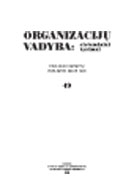Visuomenės senėjimo iššūkių valdymo prielaidos
ASSUMPTIONS FOR MANAGING THE CHALLENGES OF AGING SOCIETY
Author(s): Jonas Čepinskis, Vida KanišauskaitėSubject(s): Economy
Published by: Vytauto Didžiojo Universitetas
Keywords: pokyčių valdymas; visuomenės senėjimas; socialinis likimas; moralinė vertė; management of changes; aging; social destiny; moral value
Summary/Abstract: Society is the organization where economical, political, social, demographic and cultural processes are taking place. Management of demographic processes has become a relevant issue in the past eighteen years, because Lithuania, as well as other European countries, faces demographic problems. With the start of transformation, especially after the regained independence, demographic processes have been undergoing essential changes. Fertility has dropped well below the level ensuring the placement of generation, high rates of mortality, the migration flows and volumes have increased, especially after joining the European Union. The changes in fertility, mortality and migration have produced immediate changes in the age structure. The aging, as the result of demographic processes, refers to an entire age structure becoming old. The aim of the paper is to analyze the challenges of aging society and to identify the aspects of managing the demographic processes. The object of the research – assumptions for managing the challenges of aging society The aging of the society has been discussed under the label of demographic transition. In historical view the theory analyzes the changes that affected fertility, mortality and migration, empathizes the new demographic behavior of families. Recently the families faced with essential changes in Lithuania and the family institute has basically changed. In traditional families there were not so actual financial issues, marital contracts but in modern families they became the most important ones. The predominance of financial issues could be realized as the way to manage the social destiny of the persons in aging society. The article analyses the society’s development during 1940-2008. There are three periods considering to the essential changes in all spheres of country‘s life, their character and the influence to the development of the basic demographic processes: the period of stability (1940-1990), the period of transformation (1990-2004), and the period of stabilization of changes (2004-), as the last period is not finished yet. All these periods have been characterized by the radical changes in the all spheres in countries life, value system. The datum-point of the society‘s development was chosen 1940 m. with the assumption that during this period the social destiny of present-day elderly was formed. The population is getting old so the management of aging became on of the most important object of the society development. The aging of society has impact on all spheres of life. The aging often carries negative stereotypes; aging population should be viewed warily. Aging also has impact on the relationships between generations and, of course, on the development of education, social security, health system, accommodation market. When dealing with the issues of aging, the population policy in Lithuania has to be more active and not fragmentary. The principles of the elderly employment have to be clearer. It
Journal: Organizacijų vadyba: sisteminiai tyrimai
- Issue Year: 2009
- Issue No: 49
- Page Range: 19-35
- Page Count: 17
- Language: Lithuanian

